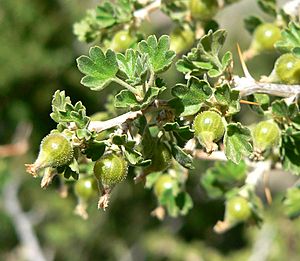Desert gooseberry facts for kids
Quick facts for kids Desert gooseberry |
|
|---|---|
 |
|
| Scientific classification |
|
| Kingdom: | Plantae |
| Clade: | Tracheophytes |
| Clade: | Angiosperms |
| Clade: | Eudicots |
| Order: | Saxifragales |
| Family: | Grossulariaceae |
| Genus: | Ribes |
| Species: |
R. velutinum
|
| Binomial name | |
| Ribes velutinum Greene
|
|
| Varieties | |
|
Ribes velutinum var. gooddingii (M.Peck) C.L.Hitchc. |
|
| Script error: The function "autoWithCaption" does not exist. | |
| Synonyms | |
|
|
Script error: No such module "Check for conflicting parameters".
The Desert Gooseberry (scientific name: Ribes velutinum) is a type of currant plant. It's known for its fuzzy leaves and edible berries. This plant is a shrub that grows in dry, desert-like areas and mountains.
Where Does the Desert Gooseberry Grow?
The Desert Gooseberry is a plant that grows only in certain places. This means it is endemic to the deserts and mountains of the Western United States. You can find it in states like Montana, Idaho, Washington, Oregon, Utah, Nevada, California, and Arizona.
It likes to grow in many different kinds of natural areas. These include dry sagebrush scrub lands. It also grows in pinyon-juniper forests and yellow pine forests.
What Does the Desert Gooseberry Look Like?
The Desert Gooseberry is a spreading shrub. It has thick, arching stems that branch out a lot. These stems can grow up to 2 meters (about 6.5 feet) long. Along the stems, there are sharp spines. These spines can be as long as 2 centimeters (almost an inch). These are true spines, which means they grow from the plant's leaves.
The leaves are thick and feel a bit like leather. They are usually rounded and have three or five small bumps, called lobes. The leaves also have tiny, sticky hairs. These small leaves grow on stalks called petioles.
The flowers grow either alone or in small groups. A group of flowers is called a raceme. Each group can have up to four flowers. Each flower is small and shaped like a tube. The outer parts, called sepals, are white or yellowish. Inside, there are smaller petals that are also similar in color. The Desert Gooseberry blooms in April and May.
The plant produces a fruit that you can eat. It is a berry that is about one half to one centimeter (0.2-0.4 inch) wide. When it is young, the berry is yellow. As it gets older, it turns reddish or purple.
Different Kinds of Desert Gooseberry
There is a special type, or variety, of Desert Gooseberry.
- Ribes velutinum var. goodingii — This is called Gooding's gooseberry. It grows only in the Great Basin area. This region includes parts of California, Nevada, Idaho, Washington, and Oregon.
 | Shirley Ann Jackson |
 | Garett Morgan |
 | J. Ernest Wilkins Jr. |
 | Elijah McCoy |

